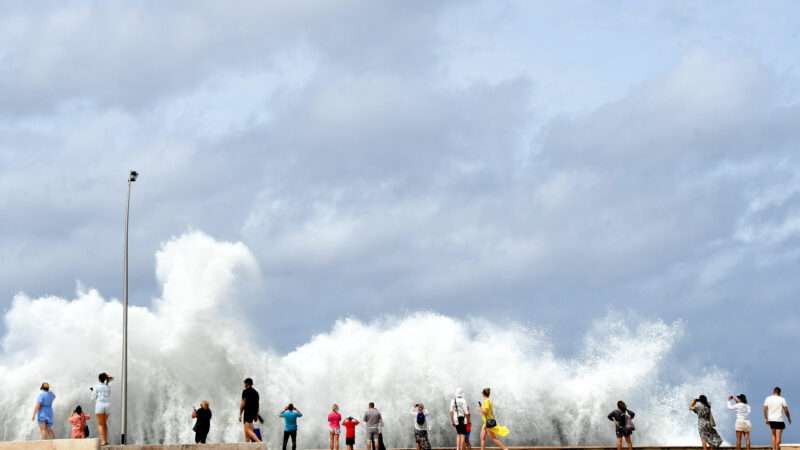
Three million Americans without power this morning: Hurricane Milton made landfall overnight close to Siesta Key, Florida, as a Category 3 storm with maximum wind speeds of 120 mph.
Fatalities have already been reported due to tornadoes that formed as a result of the storm. The hurricane has now weakened to a Category 1, but millions are without power this morning with plenty of property damaged sustained. Milton will now be making its way toward Florida's east coast, but flash flood and storm surge warnings remain in effect for large parts of the state.
So far, the storm has destroyed the roof of a stadium in St. Petersburg, where emergency workers were sheltering, and flooded Tampa's Hillsborough River, but it's looking like the worst of the storm narrowly missed Tampa, thus sparing it even worse storm surges.
Why are these hurricanes so destructive? Many environmentalists will tell you that storms like Helene and Milton are getting more frequent; climate skeptics, meanwhile, will point to this year's storm season and rightfully note that we haven't seen a huge spike in frequency of hurricanes over the last few years. But arguing over that specific point alone would probably be wrong, because climate change is affecting several different factors. For example, "global heating made both of these storms more powerful than they had to be," writes Mark Gongloff for Bloomberg:
"On the morning before Milton's landfall, the research group World Weather Attribution released a report estimating climate change had made the sea surface temperatures fueling Helene 200 to 500 times more likely. The extra energy provided by this heat jacked up wind speeds and the rainfall that flooded supposed climate havens in the Appalachian Mountains hundreds of miles from shore.…[Milton] passed through hot Gulf water, which helped intensify it from a mere tropical storm to a Category 5 behemoth in less than 48 hours, one of the fastest cases of rapid intensification on record. It hasn't been alone this season; both Helene and Beryl, which hammered the Caribbean, Mexico's Yucatan Peninsula and Texas in early July, also strengthened quickly because of freakishly warm sea water."
"Climate change may not cause hurricanes, but when they do form, it tends to turn them into blockbusters," concludes Gongloff. "That means anyone in the potential path of a hurricane—which can extend hundreds of miles from shore, as Helene taught us—needs to be prepared for the worst."
Of course, the thing a lot of global warming types won't say is that this has implications for whether we rebuild, and how. Some of the reason why there's so much catastrophic destruction from these types of weather events is because we build in places we shouldn't, and insurers don't properly price risk into the equation (or are prevented from charging the full amount by the government).
Consider the National Flood Insurance Program, which is managed by FEMA, and created in the 1960s so that homeowners in risky areas can reasonably pay for insurance. "Federal law requires that mortgaged properties in designated flood hazard areas carry flood insurance, but insurance premiums in oft-flooded areas are significantly more expensive (if they're even offered at all)," writes Reason's Joe Lancaster. "The NFIP offers federal backing for policies that private insurers would not otherwise touch or that would be too expensive for most people to afford." And it's not like this policy covers just a few people; some 5 million people are the beneficiaries of this federal backing. California, meanwhile, has regulations on the books that attempt to prevent insurers from accurately pricing wildfire risk, which has resulted in insurers like State Farm fleeing.
Even more Florida: "[Donald] Trump winning every swing state but Arizona?" asks polling analyst Nate Silver. "Surprising. [Kamala] Harris losing Pennsylvania and Michigan but winning Arizona, Georgia, and North Carolina? Really surprising. But what about Harris winning Florida?"
"Florida hasn't really been on our radar, and for good reason. The once quintessential swing state just isn't anymore. Donald Trump won the state in 2016 and doubled his margin of victory in 2020, Republicans have supermajorities in both state legislative chambers, and the state hasn't elected a Democratic senator since 2012. Does Florida's rightward shift make the state a lost cause for Harris that isn't worth an investment of her campaign's limited resources? As usual, it's not that simple."
The full piece is useful if you're interested in gaming out a scenario—not likely, but certainly possible—in which Harris wins Florida's 30 electoral votes.
Perhaps this specific one is far-fetched, but Harris' performance late in the season (and cringey media blitz) has been shockingly good, with her fundraising haul totaling $1 billion since she entered the race just two short months ago. Trump "has raised around $853 million this calendar year in concert with the party, according to a tally of his campaign's public statements," per The New York Times. It's anyone's game, and we all stand to lose! (Representative title summing up October polling, from Emerson College: "Mixed Movement Across Swing States Shows Dead Heat.")
Scenes from New York: "The Palestinian resistance is moving their struggle to a new phase of escalation and it is our duty to meet them there," Columbia University Apartheid Divest—a real student group, leading protests against the Israel-Hamas war—wrote on the messaging app Telegram on October 7 of this year. "It is our duty to fight for our freedom!"
On Tuesday, it rescinded a statement it had made, apologizing for the rhetoric of one of its members, Khymani James, who had said last school year in a disciplinary hearing that administrators should "be grateful that I'm not just going out and murdering Zionists" and "Zionists don't deserve to live comfortably."
("I will not allow anyone to shame me for my politics," James followed up, via Twitter. "Anything I said, I meant it.")
On October 3, the group wrote that it had been almost "one year since the genocide of Palestinians escalated following resistance led by Hamas against Israel's continued violent occupation." The October 1 light-rail attack in Jaffa, by Hamas, which killed six victims, including a mother who was wearing her baby in a carrier, was referred to as "a significant act of resistance" which "target[ed] Israeli security forces and settlers." Expect protests to get more unhinged, and retellings of violence in the Middle East to deviate further from reality.
QUICK HITS
- "Federal Reserve Chair Jerome Powell is unlikely to win another big interest-rate cut from his policy committee so long as the labor market holds up," reports Bloomberg. "Powell described the move as a recalibration aimed at making sure the labor market remained strong at his press conference after officials reduced the benchmark lending rate by a half percentage point to a range of 4.75% to 5%. The move broke with the gradualism typical of Fed interest-rate changes."
- "U.S. President Joe Biden and Israeli Prime Minister Benjamin Netanyahu spoke on Wednesday about potential Israeli retaliation against Iran while Lebanon's Hezbollah said its fighters pushed back advancing Israeli forces along the border," reports Reuters.
- No, it's not:
Let's be clear. Allowing Trump to hold an event at MSG is equivalent to the infamous Nazis rally at Madison Square Garden on February 20, 1939 2/3
— Senator Brad Hoylman-Sigal (@bradhoylman) October 9, 2024
- This is correct but should probably also be paired with charts on cost-of-living increases, which I would imagine Vance has in mind:
Senator, I'm sure you didn't mean to mislead anyone, but according to the Federal Reserve the net worth of young Americans has surged since 2019, and is at an all-time high. https://t.co/xVPYD6f7ZW pic.twitter.com/OWwihxGGYF
— Justin Wolfers (@JustinWolfers) October 9, 2024
- The correct take on the multiday CBS meltdown (oh yeah, the one that's happening as millions of Americans deal with hurricane aftermath and even more millions deal with displacement and an active storm wreaking havoc):
Y'all shouldn't hold meetings. An interview happened on a show. It does not require meetings. It requires one grown-up to explain interviews to staffers in this news organization, perhaps on a pink slip. https://t.co/EFltNTHf8t
— Mary Katharine Ham (@mkhammer) October 8, 2024
- I have no idea if it's based in much at all but I kind of love the anti-seed oil brigades, in part because I find the flavor of alternatives like tallow to be so much better:
Incredible things are happening in Lower Manhattan pic.twitter.com/OeYNguxHJl
— willy ???????? (@willystaley) October 9, 2024
The post Floridaposting appeared first on Reason.com.







